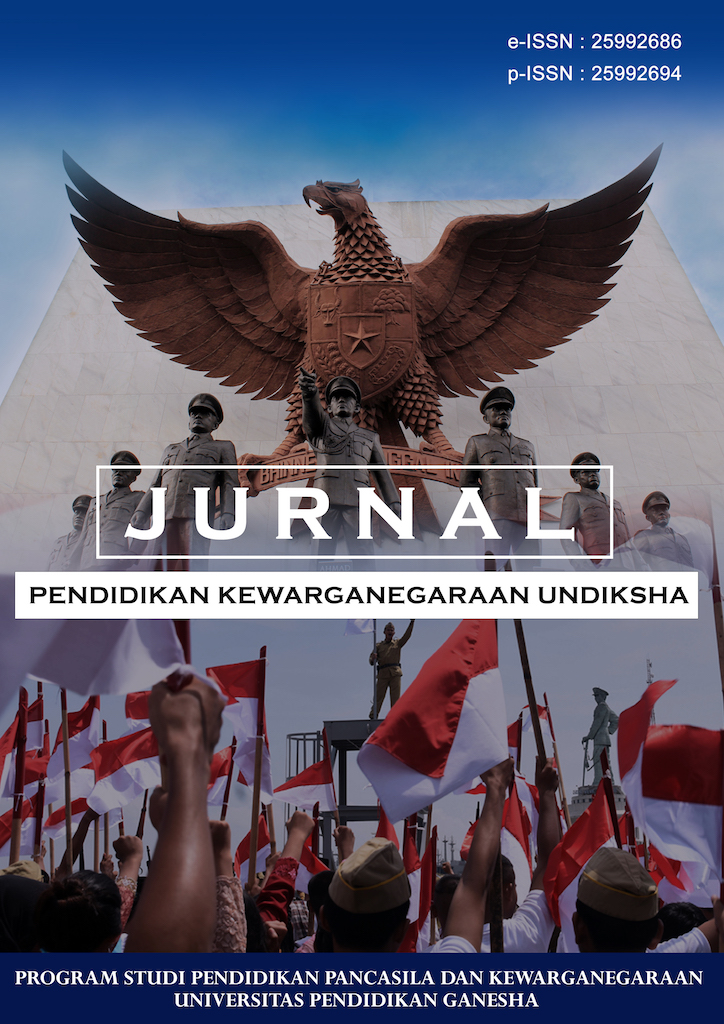IDENTIFIKASI NILAI-NILAI KARAKTER PESERTA DIDIK YANG MENGIKUTI KEGIATAN PRAMUKA DI SMP NEGERI 6 SINGARAJA
DOI:
https://doi.org/10.23887/jpku.v3i3.20799Abstract
Abstrak
` Penelitian ini bertujuan untuk mengetahui nilai-nilai karakter peserta didik yang mengikuti kegiatan Pramuka di SMP Negeri 6 Singaraja, dan mengetahui hambatan-hambatan yang dihadapi kegiatan Pramuka dalam mengembangkan karakter peserta didik serta alternatif penyelesaiannya. Penelitian ini merupakan penelitian survey yang menggunakan metode deskriptif dengan pendekatan deskriptif. Lokasi penelitian ini adalah SMP Negeri 6 Singaraja, Kecamatan Buleleng, Kabupaten Buleleng. Subjek penelitian ini adalah seluruh anggota Pramuka SMP Negeri 6 Singaraja kelas VII dan VIII. Pengambilan sample penelitian dilakukan dengan teknik purposive sampling dan random sampling. Teknik pengumpulan data menggunakan metode observasi, wawancara, pencatatan dokumentasi dan angket/kuisioner. Instrument pengumpulan data yang digunakan yakni pedoman observasi, pedoman wawancara, pedoman pencatatan dokumentasi dan angket/kuisioner. Data yang telah terkumpul tersebut selanjutnya dianalisis menggunakan analisis deskriptif kualitatif.
Hasil penelitian menunjukkan bahwa di SMP Negeri 6 Singaraja terdapat kegiatan Pramuka yang memiliki peranan dalam pengembangan karakter peserta didik. Kendala-kendala dalam pelaksanaan kegiatan Pramuka di SMP Negeri 6 Singaraja antara lain: kurangnya Pembina Pramuka yang professional, sebagian siswa masih merasa acuh sehingga malas mengikuti kegiatan Pramuka, lapangan sekolah yang tidak mampu menampung seluruh anggota Pramuka, tidak semua guru memiliki kompetensi untuk memberikan Pramuka di dalam kelas. Alternatif pemecahan kendala tersebut pihak sekolah mencari tenaga Pembina Pramuka sukarela dan memberikan pembinaan pentingnya Pramuka bagi peserta didik.
Kata kunci: Karakter, Praja Muda Karana (PRAMUKA)
Abstract
This study aims to determine the character value of students who follow the activities of the scouts in junior high school of 6 Singaraja, and knowing obstacles facing in the activities of a scout in the development of the character of learners as well as an alternative settlement. This study is the research survey using the descriptive with the approach in junior high school of 6 Singaraja, Buleleng district, Buleleng regency. The subject of this research is all member scouts junior high school of 6 singaraja class vii and viii. A sample of the study was conducted with purposive sampling and random sampling. The techniques collecting data using observations, interview, registration documentation and inquiries or questionnaires. Instruments collecting data used the guidelines for observation, interview guideline, guidelines for the registration of documentation and inquiries or questionnaires. The data that has been gathered the next analyzed using analysis the descriptive qualitative.
The results of research shows that in junior high school of 6 Singaraja there are activities scouts who have the role of character development students. Obstacles in the implementation of the scout activities in the junior high school of 6 Singaraja among other: the luck of leader scout a professional, the school yard was not able to accommodate all members scout, not all the teacher have competence to give scouts in the class. An alternative to solving the constraints of the school looking for the leader scouts voluntarily and give coaching the importance of scout for students.
Keywords: Character, Scout
Downloads
Published
Issue
Section
License
Authors who publish with the Jurnal Pendidikan Kewarganegaraan Undiksha agree to the following terms:
- Authors retain copyright and grant the journal the right of first publication with the work simultaneously licensed under a Creative Commons Attribution License (CC BY-SA 4.0) that allows others to share the work with an acknowledgment of the work's authorship and initial publication in this journal.
- Authors are able to enter into separate, additional contractual arrangements for the non-exclusive distribution of the journal's published version of the work (e.g., post it to an institutional repository or publish it in a book), with an acknowledgment of its initial publication in this journal.
- Authors are permitted and encouraged to post their work online (e.g., in institutional repositories or on their website) prior to and during the submission process, as it can lead to productive exchanges, as well as earlier and greater citation of published work. (See The Effect of Open Access)










